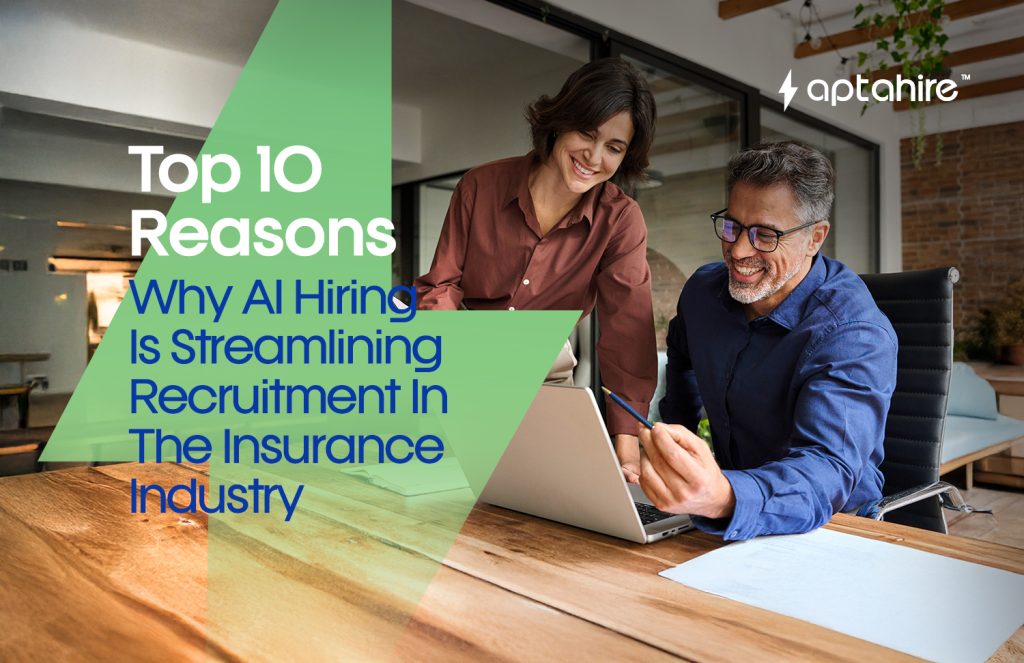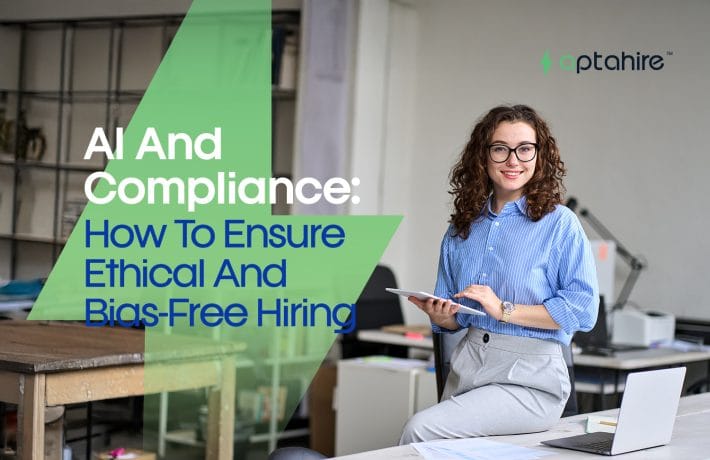Top 10 Reasons Why AI Hiring is Streamlining Recruitment in the Insurance Industry

Introduction
The insurance industry is evolving rapidly, driven by digital transformation, changing customer expectations, and an increasingly competitive landscape. According to a Deloitte 2024 outlook, over 82% of insurance CEOs identified talent acquisition and workforce transformation as top priorities. Yet, traditional recruitment methods often fall short in terms of speed, accuracy, and scalability. Enter artificial intelligence. AI hiring solutions are helping insurance companies make smarter, faster, and more strategic hiring decisions. They’re transforming how talent is sourced, screened, and onboarded. This blog unpacks how AI is streamlining recruitment in the insurance sector and why it’s becoming indispensable.
1. Automating Repetitive Tasks
Hiring in insurance often involves large volumes of resumes, especially for entry-level roles like claims processors, customer service agents, or sales advisors. AI-powered tools can handle the bulk of these administrative tasks, from resume screening and parsing to sending follow-up emails and scheduling interviews. According to a McKinsey report, automation can save recruiters up to 40% of their time on repetitive processes. By taking over this workload, AI frees up HR teams to focus on strategic hiring decisions.
2. Accelerating Time-to-Hire
Speed matters, especially when you’re trying to secure top talent in a competitive market. A LinkedIn Talent Trends report states that the average time-to-hire in the insurance industry is 41 days. AI helps insurance firms drastically reduce this timeline by instantly matching applicants to job requirements, analyzing their qualifications, and even initiating first-round assessments. This ensures that high-potential candidates don’t fall through the cracks or accept offers elsewhere.
3. Enhancing Candidate Quality Through Predictive Analytics
AI tools analyze vast amounts of data to predict which candidates are most likely to succeed in specific roles. For example, predictive algorithms can identify traits and experiences that correlate with high performance in underwriting, actuarial positions, or risk assessment. Research shows that companies using predictive hiring analytics are 24% more likely to have a strong pipeline of high-quality candidates. This results in better-fit hires who are more likely to stay and grow with the company.
4. Minimizing Bias in Hiring
Diversity and inclusion are critical in the insurance industry, both for ethical reasons and to better reflect diverse customer bases. AI can reduce unconscious bias by anonymizing candidate data and ensuring each application is evaluated solely on qualifications and experience. Studies by Harvard Business Review show that blind hiring through AI can improve gender and racial diversity by up to 25%. While no system is perfect, AI provides a structured and consistent approach that improves fairness.
5. Improving Candidate Experience
Today’s candidates expect fast, transparent, and personalized experiences. AI chatbots can provide real-time updates, answer queries, and guide applicants through the process. According to IBM, 66% of candidates are more likely to accept a job offer if the hiring process feels engaging and responsive. Automated status notifications and AI-enhanced interview scheduling significantly improve communication, making candidates feel valued and informed.
6. Supporting High-Volume Hiring During Growth Phases
Whether launching new insurance products or expanding into new markets, companies often need to scale teams quickly. AI is ideal for handling high-volume recruitment without compromising quality. It can assess thousands of applications in minutes, prioritize high-potential candidates, and reduce bottlenecks in the hiring funnel. For example, one large insurer reported a 60% reduction in screening time after implementing AI-based systems.
7. Elevating Internal Mobility and Workforce Planning
AI doesn’t just help with external hiring. It can also identify internal candidates for new roles based on skill mapping, performance history, and career preferences. This supports internal mobility, succession planning, and employee retention, all critical to long-term workforce strategy in insurance. Companies using AI for internal mobility have reported up to 32% better employee retention and engagement.
8. Streamlining Compliance and Documentation
Insurance is a highly regulated industry. Hiring involves collecting and verifying various certifications, background checks, and regulatory documents. AI tools can automate compliance checks and flag inconsistencies, ensuring that all legal and policy requirements are met without manual oversight. According to Capgemini, 58% of insurers use AI to manage compliance more effectively and reduce legal risks.
9. Enhancing Data-Driven Decision Making
AI transforms recruitment into a data-rich function. Insurance companies can gain insights into hiring metrics such as source of hire, time-to-productivity, and cost-per-hire. According to LinkedIn’s Global Recruiting Trends report, data-driven recruiting is associated with a 30% increase in overall hiring effectiveness. These analytics help HR teams make better strategic decisions and continuously refine their recruitment processes.
10. Adapting to Remote and Hybrid Work Models
With many insurers embracing flexible work arrangements, AI has become essential in managing remote hiring. From video interview analysis to virtual assessments, AI enables seamless remote recruitment. It ensures that geographic boundaries don’t limit access to top talent. A Gartner survey found that 75% of companies now use AI to facilitate hybrid and remote workforce management.
Industry Insights and Trends
According to a 2024 PwC Insurance Survey, 65% of insurance executives believe that AI will significantly impact their HR operations in the next two years. Additionally, over 70% of leading insurers have already adopted AI tools to optimize some part of their recruitment funnel.
Companies like Allstate, AIA, and AXA are investing heavily in intelligent hiring platforms. These tools are not only improving efficiency but also helping them identify future-ready talent that can adapt to evolving roles, such as data scientists, cybersecurity analysts, and customer experience strategists. According to the World Economic Forum, these roles are expected to grow by over 33% by 2027 within the insurance sector.
Tips for Getting Started with AI Hiring in Insurance
- Begin with a pilot program for a specific role or department to test AI tools in a controlled environment.
- Ensure that your data is clean, structured, and compliant with data privacy regulations like GDPR or local labor laws.
- Choose platforms that are transparent in how they make decisions and allow for human oversight.
- Train HR staff and hiring managers to interpret and validate AI-generated insights.
- Regularly audit AI tools for fairness, bias, and performance.
Interesting Facts
- AI tools can reduce hiring costs by up to 30% and time-to-hire by nearly 50% in high-volume insurance roles.
- Chatbots integrated with AI are now answering up to 80% of candidate queries, improving engagement and satisfaction.
- Some insurers are using AI to create digital twin profiles of top performers to model ideal candidate profiles.
- AI can improve offer acceptance rates by 25% through targeted engagement and follow-up campaigns during the hiring cycle.
- Talent acquisition teams using AI are 50% more likely to hit their hiring goals and stay within budget.
Final Thoughts
The insurance industry is no stranger to data-driven transformation. From underwriting to fraud detection, AI has already proved its worth. Now, it’s revolutionizing recruitment. By automating routine tasks, improving candidate quality, and providing strategic insights, AI hiring is helping insurers build agile, diverse, and future-ready teams.
As the war for talent intensifies and job roles evolve, companies that embrace AI hiring early will not only gain operational efficiencies but also secure a long-term competitive advantage. For insurance leaders looking to streamline recruitment and elevate their workforce, AI is no longer optional. It’s essential.
FAQs
1. How is AI transforming the recruitment process in the insurance sector?
AI is automating time-consuming tasks like resume screening, interview scheduling, and candidate follow-ups. It helps HR teams make faster, data-driven decisions, improving hiring accuracy and efficiency, especially in high-volume roles like claims processing and customer support.
2. What kind of roles in the insurance industry benefit most from AI hiring tools?
Entry-level positions such as claims handlers, sales agents, and customer service representatives benefit from speed and scale. At the same time, specialized roles like actuaries, data analysts, and underwriters gain from AI’s predictive analytics that match skills with job performance indicators.
3. Can AI hiring tools reduce bias in the insurance recruitment process?
Yes, AI can anonymize resumes, evaluate candidates purely on skills and experience, and apply consistent criteria to every applicant. While human oversight is still essential, AI helps limit unconscious bias and supports fairer hiring practices.
4. How does AI support compliance and regulation during hiring in the insurance industry?
Insurance firms operate under strict compliance requirements. AI ensures that certifications, background checks, and required documentation are collected and verified automatically, reducing manual errors and flagging any inconsistencies.
5. What are some measurable outcomes of AI adoption in insurance hiring?
Companies have reported up to 50% reduction in time-to-hire and 30% savings on hiring costs. AI-enhanced chatbots have managed up to 80% of candidate queries, significantly boosting applicant engagement and satisfaction.
6. How can insurance firms get started with AI hiring tools?
Start with a small pilot in one department, ensure data quality, select a transparent and compliant AI vendor, and train your HR team to understand and interpret AI-driven insights. Periodic audits for bias and performance are also crucial.
7. Are major insurance companies already using AI in recruitment?
Yes. Leading insurers like AXA, Allstate, and AIA are already leveraging AI to optimize candidate sourcing, reduce manual screening time, and improve long-term talent strategy. Many are also integrating AI into broader workforce planning initiatives.



